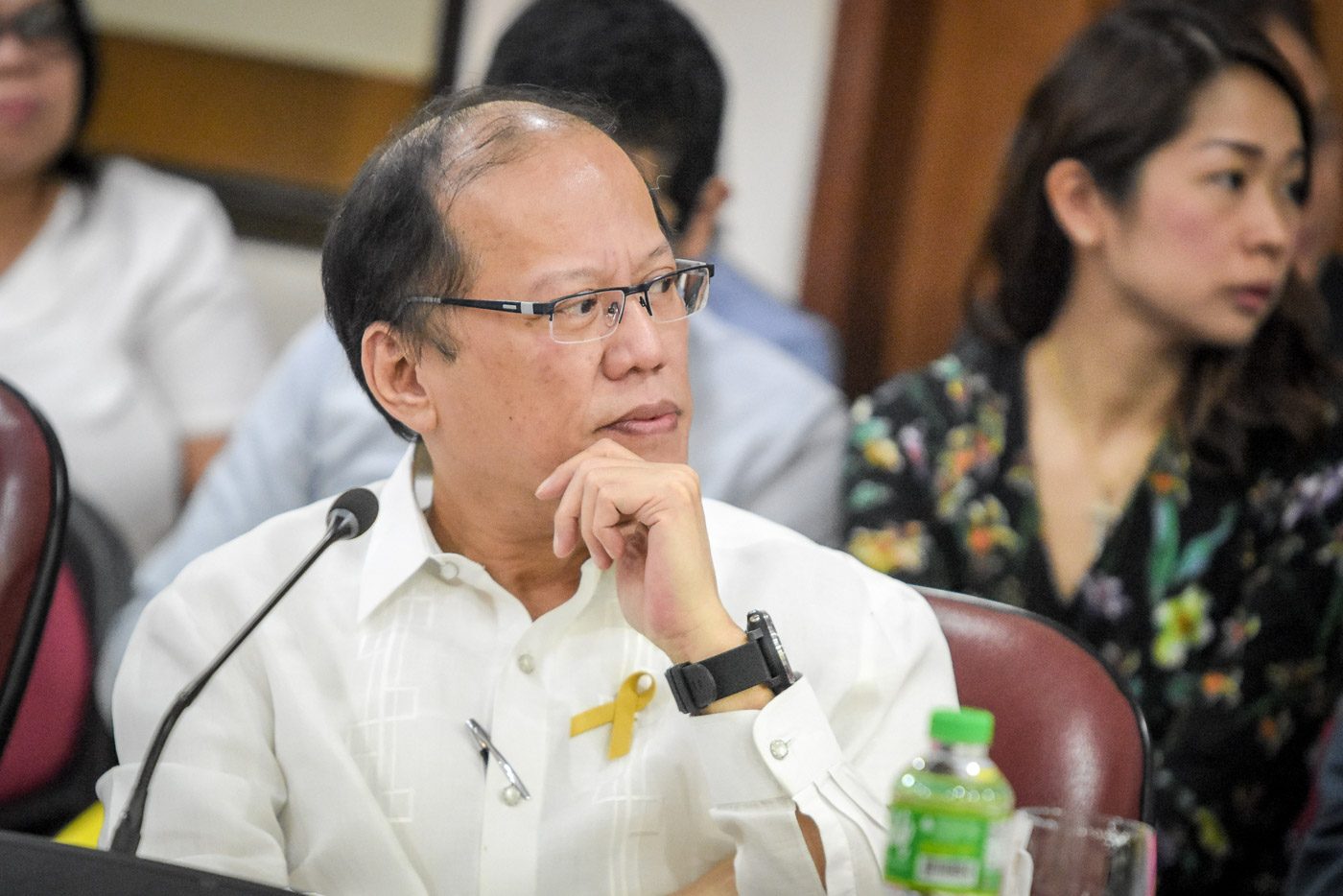SUMMARY
This is AI generated summarization, which may have errors. For context, always refer to the full article.

MANILA, Philippines – Former president Benigno Aquino III on Monday, February 26, denied there was “rush” in the now-controversial purchase of P3.5 billion worth of anti-dengue vaccines for a mass vaccination program.
“The problem started in 2010, you did everything that you could do. And then you are told that something is forthcoming, a new weapon against this disease. 2014 came, they said it was coming. And in 2015, it was finally ready. This problem has persisted since, what, the 1940’s or the 1950’s?” said Aquino in a mix of English and Filipino during a chance interview with reporters on the sidelines of a House probe into the purchase of Dengvaxia vaccines during his administration.
Already controversial then, the program is now being probed anew by Congress after manufacturer Sanofi Pasteur in November 2017 admitted that the vaccine is not suited for persons who had yet to contract the virus prior to getting the shot. (WATCH: House hearing on Dengvaxia)
The Aquino administration has been accused of rushing the procurement and the program, despite qualms from health experts – including those from the health department – over the use of a relatively new vaccine in a mass immunization program. (TIMELINE: Dengue immunization program for public school students)
Aquino, testifying during the hearing, said that the health department observed in 2010 an increase in dengue cases in the country. Dengue is endemic in the Philippines, meaning it is regularly found in all regions of the tropical country.
In late 2015, or just before the fiscal year ended, the health department requested that savings from the 2015 be used to fund their programs, including a mass vaccination program for dengue.
Speaking to reporters, Aquino reasoned out that he also did not want to deprive the poor, who can barely afford proper health care, the same health protection enjoyed by the rich.
When asked about the controversial program, former budget secretary Butch Abad told lawmakers that “there could have been adjustments in their [previous officials of the health department’s] approach if they had the information we have today.”
Dengvaxia timeline
It took a little over a year between Aquino’s first meeting with Sanofi officials and the eventual go-signal to fund the mass vaccination program.
Aquino first met Jean-Luc Lowinski, Sanofi’s senior vice president in Asia in November 2014. Months later in January 2015, Sanofi submitted requirements to obtain a permit from the Food and Drug Administration (FDA).
In May 2015, then health secretary Janette Garin visited the drug vaccine manufacture’s facility in France, on the sidelines of an official trip. Months later in December 2015, Aquino met Sanofi executives in France.
By December 29, 2015, or a little over two weeks after Garin submitted their proposal to use savings for the mass vaccination program, the budget department released the Special Allotment Release Order to the health department for the dengue vaccination program.
‘Experts’ and vaccine fears
The former president also criticized non-experts who expressed opinions on the issue, leading to misinformation and sowing fear among the public, particularly parents whose children were vaccinated.
“These parents had their children vaccinated. It’s right that we give them the right information but to sow doubt, rumors… we’re only giving them anxiety,” said Aquino of parents and guardians distraught over the possible effects of Dengvaxia on school children who took part of the program.
Aquino, who appeared before the Senate’s probe into the program back in December 2017, said parents must be given “correct information” for them to take the right steps.
“Ako po, number one, nakikiramay sa namatayan. Maganda pong malaman talaga kung ano ba ang kadahilanan kung bakit namatay ang kanilang kaanak. Two, ma-cocorrect natin yun sitwasyon, di ho ba?” said Aquino, when asked his message to parents whose children were vaccinated
(First, I want to express my condolences. It’s important that we find out what really caused the deaths of their loved ones. Two, it’s improtant so we correct the situation, right?)
He added: “‘Wag tayong magpapadaan ng emosyon o puro emosyon… o puro yun ngang, baka nagagamit tayo dito. Sa dulo po niyan baka makagawa tayo ng mga hakbang na imbes magpapaganda ng sitwayson ay magpapalala ng sitwasyon.”
(Let’s not be carried away by emotion or by emotion alone because there’s a risk that we’ll just be used. We might end up doing things that make the situation worse instead of improving it.)
A University of the Philippines-Philippine General Hospital (UP-PGH) panel formed to probe the Dengvaxia program is studying the deaths of 39 vaccinated school children who died. The causes of their deaths have yet to be determined.
Following Sanofi’s announcement in November 2017, the health department stopped to the vaccination program.
It has also since said, citing reports from the field, that participation in government health programs – from vaccinations to deworming – have dropped amid Dengvaxia fears. – Rappler.com
Add a comment
How does this make you feel?
There are no comments yet. Add your comment to start the conversation.